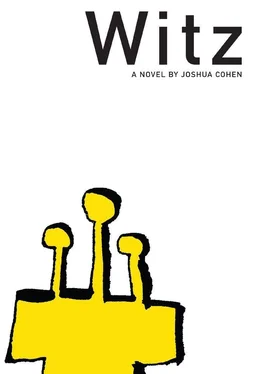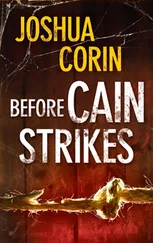Some find it perplexing, or funny, even, gatesgallowshumorous, but others understand its seriousness, its gravity, and it’s them that do best; understanding that it’s all party to the experience, packagedealed; that what’s required is less an appreciation of the end than of the means by which the end must come to be suffered: what’s important isn’t the moral, which is bankrupt despite, but the spiel by which the moral must be indulged. For the sake of the sake, say. Get in line; stay for the line, too. Throughout, without doubt, and yet with doubt, as well, the entrant must suppress an urge to seek, to turn, over a shoulder, to receive or solicit advice of any kind or kindness, and must also refrain, once passed and waiting again, from offering any advice to those who would follow, to provide them with any encouragement or instruction from what’s only the safety perceived of their waiting area, their line’s muster, its haven hopedfor, designated behind a cordon of columns. As they wait for the rest of the Group, any pride in their passing slowly diminishes, gives way person to person, with each other subsequent pass; a disappointment: by the time the remainder arrive, pass through and wait for their Guide to pass as the guiding umbrella’s inspected for holes, their supplicant stamps are already gone — it’s disappearing ink.
Unprompted, then, they follow the script, though entrance is becoming easier and easier, easier than ever these days, especially once you’re inside…in the earliest days of the first transport, the initial experiments, how Polandland had tried to micromanage, age and height and health requirements strictly enforced; for certain attractions, that is, but not anymore — what’s the use? Lately, all are welcome to everywhere, whether they’re ready or not, preparation or no, they’re forced to a welcome — and now, it’s become not program but pilgrimage, is how it’s put, now that they’re not scheduled but punctually leisured to death, that’s how we like to think of it, anyway; the Gates swung open, rustily, perfectly, perfect in their rust and swing, and everything’s available, save exit, of course. They’ve paid their entrance in eyeteeth, fees in wives and daughters, in family, in fingers and toes; reduced admission for students, and seniors, too, with presentation of proper ID. Many have been wheeled through the eminently accessible Handicapped Gate, steeply ramped. Most are happy to walk. To pay extras, miscellaneous surcharges, the price of exorbitant whim. To sign those waivers, initial here here and here the disclaimers — there’s my X, cross me off, black me out. They replace their wallets under their layers, larval, their varval strata, these personal rings…stuff their documents, too many documents, too much paper, into their shoes for warmth, too many seals, too many approvals. They’re lined through the turnstiles just past the Gate, a distracting concession to the modern; despite the ceremony, an accounting must strictly be made. A record, is meant. A son, too short, underneath the metal arm and so, unregistered; despite, even he won’t survive. Clock strikes Bell, the nest of a cock whose comb is a bejeweled caparison. Crowing. It’s never closingtime. Until. There’s so little of it, time, and O their God there’s so much to do!
In the Cemetery
Here is the Cemetery…a field circumscribed by walls, which are a fence, shot through with gates of its own. The field’s a sharp rise, a precipitous mound, almost a grave itself, unmarked and yet mounting against that anonymity, a natural monument to its own forgottenness, a mess of enclosed earth overgrown not made of layers poured upon layers, which would be like the turned and turning pages of a book, or like consecutive, linear, narrative time, but more like a book whose pages are inseparable from one another, its covers, more like a time that doesn’t proceed forward or back but that stands still subsuming every moment, past, present, and future. Atop this hunch, within it, of and below it, it itself, are its tombstones, the topmost of them lately pulled up straight to stand, reset, like starved teeth, like cuticle parchment, the exposed bones of eggs…becoming pushed in, out, clustered, crowded, dirt-dense, rockthick, stonetight, as if the most impermeable efflorescences of the mound itself, forget weather; of the same material, only its most exterior, and so necessarily hardest, manifestation, that with the most edges, the sharpest against the shaped, shaping wind. Overgrown with grass, weathered to pale, this small parcel of fenced land, this earthen scar allotted for burial — a hump’s wound wanting for raum, for its healing. There will be no further exhumation; it’s not allowed. For them, it’s only the transience of this one walk through, a quick cursory circuit, twisting left, winding right, their eyes trying to take everything in — to mouth to themselves, each other, these names, which are halfheard, which are mispronounced, between their tongue and these teeth: to see the , which is the sound the tongue makes clucked between the teeth; to inscribe them upon their pupils, too, to make gravestones, tombstones, headstones out of their very own heads: stonestones, markers made of wood and of rock, of all different ages and eras leaning on each other, falling for one another, and over, huddled to keep warm in the freeze.
This is one of the very few cemeteries to be found inside walled cities, or so the Guide says.
Most are outside, says the Guide, most were forced outside, had been granted outside: begrudged to them nearby sites of execution, adjacent to carrion pits.
Everyone with me?
Here’s where you wash your hands clean, called the lavabo; don’t worry, we’ll be passing another.
Here’s where you purify, where you ritually guard the body, the corpse, keep watch over and yadda.
Here’s the shed for the funeral coach, the caravanserai’s the term, if you will.
Here the bier, here the common coffin for transport, because…
There, the loom of the shrouds; they’re woven from eyelash, you know…the Guide points with her umbrella, she’s poking.
Here the Sexton’s quarters, the Shammes’, the Cemetery Caretaker’s there. Across the street, the Guide umbrellas — the mason and wheelwright over there then the smithy, turn around, marked on the maps they hold in their hands with their respective guild seals, interpret…here, she says, it’s another lavabo, and so someone finally stops, riffles through his clothing for a camera not yet confiscated (how even the few survivals have been carefully planned for effect), takes a photograph of this relic in silver tarnished, smoky, handled in ivory, austerely no frills, half sunken in ivy, grass, and miscellaneous weed. Suddenly, that blackishbird swoops down out of the sky to fly away with the camera that anyway wasn’t loaded, that didn’t have any film, which’d been confiscated back at the aeroport.
There’s a nest of lenses, somewhere, it’s said.
Here, the Guide says again, the gate for the Priests, opposite the Gate where we’ve entered.
In the beginning, there were slab tombstones, stele, then the tombs with lids like sarcophagieyes, Egypt, if you remember it, then the desert, which’d been tented in rock like a mountain; then a period of double tombstones over a single plot, like another pair of peeled stones keeping watch: husband and wife sharing one earth. Menschs laid to rest under their names, the symbols of their family, their labor, occupations, as they once lived under the signs of their houses: the Cohens, the priests, they were buried in their own section under the relief of their hands, splayed and winged, then a fish, for the Levites, a jug, a dish, a crown and a book, a tailor’s scissors, a doctor’s scalpel, a lawyer’s scales, lions and deer; more birds swooping down to perch atop tombs, crows turned to rock, ravenrock. Dark. Pinch me, the icemensch’s pincette. They approach the inscriptions, wearied, weathereffaced, and they kneel, go to make rubbings with provided materials. One year later, their Guide says, not that they’d live — it’s the consecration of the burial, the unveiling, that’s when the tombstone’s set, placed: at least, that’s the tradition, they’re told, they believe. There, the rabbi’s section of the Cemetery. Here, husbands and wives had been buried separately…over yonder the sections reserved for the suicides, for the murderers further, and then that reserved for the bastards, no more illegitimate than anyone else nowadays. They lay little stones upon all the graves except these, as their Guide suggests, then instructs against their compliance, then for it, resistance, then none, stones, pebbles, gravel obtained from vessels in locations wellmarked, well in advance of their arrival, thousands of years; stones atop stones, they’re burying rock, consecrating memory itself, to itself.
Читать дальше












